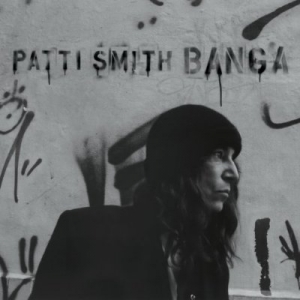Release Date: June 05, 2012
Label: Columbia
Halfway through “Amerigo,” the first song on Patti Smith’s first album of new material in eight years, the pile-driving bass line drops away and the punk matriarch adopts an uncharacteristically gentle tone. “Hey,” she murmurs dreamily over a bed of hushed strings. “Wake up. Wake up.” After 38 years, this is as vulnerable as she’s ever sounded on record, as though she’s trying to whisper the dead awake, knowing full well that she can’t.
It is Smith’s lot to survive: to bear witness and sing songs for the departed. From Robert Mapplethorpe (eulogized in her rapturously received 2010 memoir Just Kids) to Jim Carroll (whose “People Who Died” she’s covered onstage), the 65-year-old icon has outlasted and memorialized a staggering number of peers and friends. Banga has all the elements of an elder-punk wake, from her closest collaborators (including most of the cast of her 1975 breakthrough Horses) to family members to even a celebrity sighting or two (Johnny Depp!). They all join in for fond remembrances of folks gone far too soon: Those mourned include Maria Schneider, the French actress from Last Tango in Paris; neo-soul starlet Amy Winehouse; victims of last year’s Tohoku earthquake and tsunami in Japan; and even Mother Earth herself. Smith’s got a voice and heart big enough for all of them.
It’s rare for voices to improve with age, but Smith’s has never sounded better: At various places throughout Banga, she conjures up everything from mischievous fondness to abject terror. Moreover, this might be her most accessible work since her ’70s commercial peak, especially the sublime suite of pure pop songs that starts off the album. “Amerigo” (named for the Italian explorer who gave the Americas their name) launches us into a brave search for meaning — a letter full of “words that have not been written, words from the New World” — sent back to those of us too timid to take the plunge into the great beyond. The payoff comes when Smith sings of being “baptized in the rain of the New World” in a voice conveying genuine wonder.
“April Fool” narrows the scope considerably to rhapsodize about a couple of ragamuffin bohemians who “race through alleyways in our tattered coats,” backed by a beautiful keyboard lilt, plus fluttery guitar from old buddy Tom Verlaine. The craftily sequenced Banga follows this pattern a lot, frequently bouncing back and forth between large and small, poppy and poetic, joyous and sorrowful. “This Is the Girl,” a surprisingly effective foray into vintage doo-wop, pays tribute to Winehouse with a song that sounds nothing like the late singer’s work, but that you could still imagine her singing. And immediately after that we’re hit with the squalling title track, as strident and harsh as anything Smith has ever recorded, complete with her son Jackson imitating howling coyotes in the background.
Banga peaks when it brings all these contradictions clashing together on “Fugi-San,” written as a call to prayer for the Japanese earthquake victims. It might be the scariest invocation ever, with Lenny Kaye’s clarion-call guitar coming in waves and summoning forth oracular pronouncements from Smith about a “mountain of our eyes” bearing witness to mortal futility. “Will you hear our cries?” she wails. “What will a poor boy do? What will a poor girl do?”
But if you want to talk scary, nothing compares to the album’s penultimate song, “Constantine’s Dream.” A visionary epic inspired by Piero dell Francesca’s painting, it just as easily could be called “Everyone’s Nightmare”: a doomsday dirge whose sense of dread builds and builds for 10 minutes, with Smith howling about Christopher Columbus imagining 21st-century environmental catastrophe (“All of nature aflame”), sounding wild-eyed and wrapped in the throes of this terrible vision.
Then, just like that, the clouds part, and the album closes as quietly as it opened, with a cover of Neil Young’s “After the Gold Rush.” Despite its declaration that we’ve got “Mother Nature on the run in the 21st century,” it actually feels optimistic, partially thanks to the children’s choir — whose presence could have come off as schlocky, but doesn’t. It’s also a reminder that our kids are going to inherit the mess we’ve made. Someday, when the time comes, maybe one of them can sing a worthy requiem for Smith.





